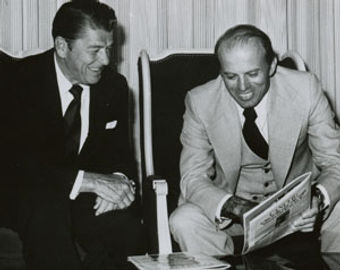The Right Resistance: If Donald Trump isn’t the change candidate in 2024, who would it be?
Most conservatives and Republicans, if they’re being honest, would admit that Donald Trump’s 2016 candidacy was a necessary event, even if there was a healthy chunk of party voters who vehemently disagreed with his behavior and elements of his platform at the time.

Why Trump? It’s something conservatives of all stripes have debated for close to eight years now. For far too long, perhaps since the conclusion of Ronald Reagan’s presidency in the late 1980’s, Republicans had no unifying person or set of principles to rally around. Sure, there were primary contests and certain Republicans were elevated by a preponderance of GOP voters, but still there was consternation among the faithful that something wasn’t quite right with the party’s direction.
Reagan’s vice president and good friend, George H.W. Bush, was the heir apparent to “Morning in America” in 1988. Conservatives harbored misgivings about the older Bush – that he wasn’t a true fiscal conservative, was wishy-washy on the social and cultural agenda and was “weak” on foreign policy – and many of those worries hit home when H.W. broke his “read my lips” pledge during his first term (and, of course, he didn’t get a second one) and failed to advance many of the causes the always watchful grassroots held dear.
Pat Buchanan’s 1992 America First campaign didn’t just materialize out of thin air, did it?
Subsequent presidential nomination cycles didn’t do a whole lot to satiate conservatives, either. Bob Dole won the GOP nod in 1996 because he was a World War II veteran, was a faithful party hand who’d run before and because conservatives couldn’t consolidate around one challenger to the Republican bluebloods. It was much the same story in 2000, though George W. Bush was considered by many to be the most acceptable conservative in the race opposite “Maverick” (in a bad way) John McCain – and Bush won the election – which was the big prize when thinking about the alternative (which was Al Gore, of course).
Bush thoroughly alienated conservatives during his eight years in the White House, particularly with his sellouts on big government (adding a new prescription drug entitlement and No Child Left Behind), illegal immigration and support for “too big to fail” bank bailouts in 2008, leaving most Republicans hankering for a change by the time G.W.B. was on his way out. John McCain was the establishment candidate in 2008 and the Arizona senator ended up the primary winner when conservatives, again, couldn’t settle on an alternative.
Mitt Romney prevailed in another process-of-elimination type primary campaign in 2012. I don’t recall a single man or woman I knew who felt good about the flip-flopping self-described “severely conservative” spineless political opportunist representing us all. Sure enough, Romney conducted a gutless campaign, and he lost the eminently winnable national election to the leftist “woke” divider, Barack Obama.
By the time 2016 came around, conservatives had had it with establishment Republicans who not only couldn’t name the salient issues, they weren’t willing or capable of crawling into the mosh pit of modern politics to do whatever it took to win. Certainly, Jeb Bush wasn’t the answer. And conservative primary voters split their favor between Donald Trump, Ted Cruz, Marco Rubio and a few others, with the “outsiders” showing dominance from the outset of the campaign.
Lots of people, myself included, reasoned that Trump’s unorthodox approach to the Republican Party was just what was needed to rescue it. The GOP might not have survived as a national political entity if changes weren’t made to the way its leaders approached the subjects that people really cared about. Trump wasn’t my first choice, but he eventually won my backing with his no-holds-barred style.
What about this year? In a piece titled “If not Trump, then who?”, John Feehery wrote at The Hill:
“It took Trump to finally say ‘enough is enough.’
“It was Trump who first questioned publicly the need for America to pay for everything when it came to the defense of the Western World. It was Trump who finally said that China was our biggest threat and that we had to fundamentally change our trading relationship with it. It was Trump who said, ‘If you don’t have borders then, you don’t have a country,’ challenging the establishment consensus that the cheap labor that came from illegal immigration was probably a net positive for the economy...
“Sure, Trump is a businessman, a marketer, a capitalist of a kind. But he wouldn’t know Russell Kirk from William F. Buckley. Perhaps it was fitting that Buckley’s National Review dedicated a whole magazine edition to condemning Trump with no positive result for the magazine and no negative impact on Mr. Trump himself. He was, and is, far bigger than the small band of intellectual conservatives who like to smoke cigars and debate the fine points of F.A. Hayek. All of this was ripe for the picking. The question today is: If not Trump, then who?”
Therein lies the divide in not only the Republican Party, but the conservative movement itself. It was Donald Trump who took the remnants of the fiscally driven Tea Party movement and combined them with America First populists, “Peace Through Strength” foreign policy realists and eventually, Supreme Court centered social conservatives and molded the disparate ideological collection into a winning MAGA coalition. These diverse interests found a hero in Trump, and to this day, remain his strongest supporters (currently seen as the “only Trump” voters). This group had largely been spurned by the Mitt Romney country club Republicans, the neoconservative Bush establishment and the increasingly left-turning Democrats, which left these patriotic Americans ripe for the picking by a tough talking lifelong real estate developer from New York City of all places.
MAGA voters appreciated the fact that Trump’s signature line from his TV show was “You’re Fired!” They realized Trump wasn’t directing his wrath at the hard-toiling working man – it was the snobby elitists in suits and white collar office jobs that Trump hoped to give a swift kick to the backside.
The highly educated and pampered David Frenches, Jonah Goldbergs, George Wills and Bill Kristols didn’t understand the Trump phenomenon. They articulated their “Trump isn’t presidential” objections, and now, to a man (or woman), they’re working at publications no one bothers with or listens to. Some of them haven’t completely rejected the Republican Party -- they merely object to the “change in direction” that Trump brought with him.
Donald Trump is still beloved by the masses because the “common folks” believe he represents them and would do anything to fight for them. Who else would battle so intently for a border wall and dare to stand up to the Democrat leadership like Trump did? As Feehery asked in his piece’s title, if not Trump, who?
Feehery’s point of view is worth exploring because his bio suggests he once worked for a “who’s who” of Republican establishmentarians (Tom DeLay, Dennis Hastert and Bob Michel). I can’t say whether The Hill writer is a complete convert to Trump-ism, but he surely sounds like he’s more of a Trump backer now.
Which is fine, because it places Feehery in the mainstream of the GOP. Trump changed the way most Republicans think about the party as well as shepherded in a much more combative and aggressive energy. These days, it seems, the establishment media is more fascinated with the “boat rockers” like Marjorie Taylor Greene and Jim Jordan than they are the “compromise” seekers in the center of the party.
Let’s not forget, the twenty Republican House holdouts in January were the ones who forced the establishment and “centrists” to bend. There’s a whole new attitude there. Will it hold? Time will tell.
In the meantime, the ongoing debate in Republican land concerns whether to award Trump another GOP presidential nomination or to hand the proverbial torch to younger, less controversial conservatives such as Ron DeSantis or Vivek Ramaswamy to carry on the MAGA work Trump started and hopes to march into the next quarter century. There’s no big mystery, then, why former Trump U.N. Ambassador Nikki Haley’s campaign is not catching on with conservative voters. Haley has no unique selling point to propel her presidential run – if anything, she looks to fill the old establishment “lane” in the primaries, the same one that led to victories for both Bush presidents, Dole, McCain and Romney. Nikki’s team even attacked Trump recently for creating too much drama. It’s almost like she’s the anti-boat rocker, which has little hope of inspiring people in the Trump era.
The establishment media likes to make it appear as though Trump couldn’t possibly win the 2024 election because of all that’s happened since his emergence in 2016. But there’s no sign that Democrats have the imaginations of the public locked up, either. Senile Joe Biden isn’t popular, and neither are the other prominent Democrat leaders.
If not Trump, who? This question will take some time to answer. Lots of things can happen between now and the heat of the campaign season in the fall of next year. Donald Trump maintains a firm hold on those who were hungry for change after decades of GOP establishment control in 2016. There’s no doubt that Trump equals change. Will Americans recognize it in time?
Joe Biden economy
inflation
Biden cognitive decline
gas prices,
Nancy Pelosi
Biden senile
January 6 Committee
Liz Cheney
Build Back Better
Joe Manchin
RINOs
Marjorie Taylor Green
Kevin McCarthy
Mitch McConnell
2022 elections
Donald Trump
2024 presidential election

